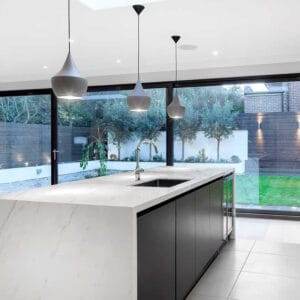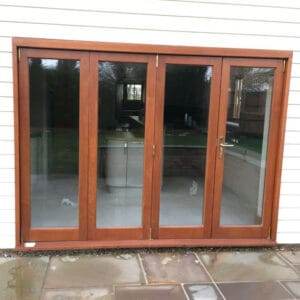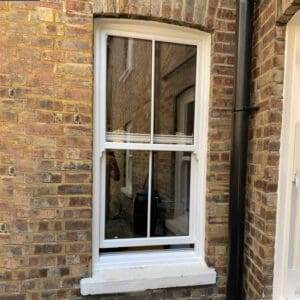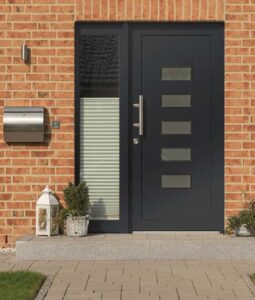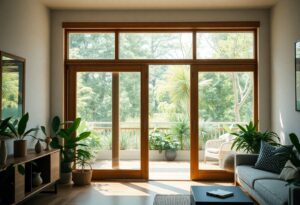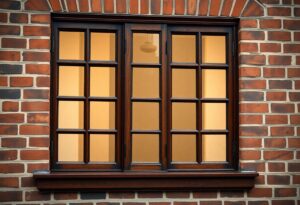Many homeowners underestimate the impact of noise pollution on their daily lives, often leading to disrupted peace and comfort at home. Selecting the right noise reduction windows can significantly enhance your living environment by minimising external disturbances and improving sound insulation. In this article, you will discover vital considerations to keep in mind, such as window materials, double glazing options, and specific features that can make a difference in your home’s acoustics. By making informed choices, you can create a quieter, more serene space for you and your family.
Understanding Sound Transmission
For homeowners, understanding sound transmission is vital for creating a peaceful living space. Sound travels through various mediums, and in residential settings, both airborne and impact sounds can disrupt your daily life. Airborne sounds, such as traffic noise and conversations, can seep through walls and windows, while impact sounds like footsteps or objects dropping create vibrations that can aggravate the noise level. Addressing both types is necessary in effective noise reduction strategies to enhance comfort and serenity (the right window can make all the difference).
Types of Sound
For a better understanding, it’s necessary to distinguish between two main types of sound: airborne and impact sounds. Airborne sounds are those transmitted through the air, including traffic, music, and voices, which can intrude into your home. In contrast, impact sounds are caused by physical impacts, such as footsteps or dropped items, creating vibrations through walls and floors. Each sound type can significantly affect your living environment, making it important to implement noise reduction strategies that address both concerns (consider the materials used in your flooring and walls).
- Sound Types: Airborne and Impact
- Airborne Sounds: Traffic, voices
- Impact Sounds: Footsteps, drops
- Living Environment: Importance of addressing both
- Assume that understanding these types aids in better solutions.
| Sound Type | Description |
|---|---|
| Airborne Sounds | Noises transmitted through air, e.g., traffic and conversations. |
| Impact Sounds | Sounds from physical impacts, e.g., footsteps and dropped objects. |
| Effects on Living Environment | Can disrupt comfort and peace in the home. |
| Noise Reduction | Strategies should treat both airborne and impact sounds. |
| Solutions | Consider noise-reducing windows and materials. |
Sound Ratings for Windows
An necessary aspect of selecting windows is understanding their Sound Transmission Class (STC) ratings. This system measures how effectively a window blocks sound, with higher STC ratings indicating better sound insulation. A window with an STC rating of 28-32 is generally considered good, while 33-38 indicates excellent noise reduction. When choosing your windows, it’s helpful to compare STC ratings to ensure you select an option that meets your noise reduction needs (consult with window specialists for optimal choices).
Plus, achieving effective noise reduction is not merely about the STC rating; it is also influenced by window construction and surrounding materials. Look for double glazing, frame quality, and seal integrity to enhance overall soundproofing. High-performance windows can considerably increase your comfort level, isolating you from unwanted outside noise (make sure these factors are part of your evaluation process).
Window Glass Options
Now that you’ve decided on soundproof windows for your home, it’s necessary to explore the right glass options available. Different types of glazing can significantly affect your home’s noise reduction capabilities and energy efficiency, setting the stage for a quieter, more comfortable living environment.
Single vs. Double vs. Triple Glazing
Behind the performance of glazing lies the science of airspace. Single glazing offers minimal soundproofing, while both double and triple glazing incorporate multiple layers of glass with insulating airspaces between. These layers effectively trap sound waves, reducing noise intrusion and improving energy efficiency. The thicker the glass and the greater the number of layers, the more effective it is at dampening sound and retaining heat, making double and triple glazing superior choices for tranquil living.
Laminated Glass
On the other hand, laminated glass consists of two or more layers of glass bonded by a layer of PVB (polyvinyl butyral). This unique composition provides excellent noise-dampening characteristics, as the PVB layer absorbs sound vibrations. Laminated glass not only reduces external noise more effectively than traditional glass options but also enhances security and safety, making it a smart choice for your home.
Consequently, laminated glass offers superior sound insulation while also improving overall durability and security. The combination of multiple glass layers with a sound-absorbing layer provides a robust barrier against noise pollution, making your living space more comfortable and peaceful. Moreover, the added protection against shattering can enhance your home’s safety. If you’re seeking to significantly reduce noise while benefiting from energy efficiency, laminated glass is an important consideration for your sound-reducing window project.
Frame Materials and Design
Some factors significantly influence the effectiveness of noise reduction windows, particularly the materials used for the frame and their overall design. The choice of frame material not only affects the aesthetic appeal of your windows but also their performance in blocking external noise. Varied materials like vinyl, wood, and aluminium offer different insulation properties, impacting acoustic performance and durability. Opting for the right combination can enhance your home’s comfort and reduce unwanted noise infiltration.
Material Choices
Beside aesthetic preferences, the material of your window frame plays a vital role in noise reduction effectiveness. Vinyl frames typically feature excellent insulating properties, contributing to lower sound transmission. Wood frames, while providing a natural appeal and good insulation, may require more maintenance. Aluminium frames, on the other hand, typically offer a modern aesthetic but may necessitate additional insulation measures to optimise soundproofing. Each material carries unique benefits that affect overall window performance and noise control.
Installation and Sealing
Around achieving maximum noise reduction, proper installation and sealing of your windows cannot be overstated. Poor installation can lead to gaps and leaks that compromise your windows’ noise reduction capabilities. Common errors include inadequate sealing, misalignment, or neglecting to address existing structural issues. These oversights can lead to sound leaks that diminish the effectiveness of even the best noise reduction windows. (Consider hiring a professional installer to ensure optimal performance).
Even the smallest gaps around your windows can lead to significant sound infiltration, negating the benefits of high-quality materials. To further enhance noise reduction, ensure that your windows are installed with the appropriate sealant to eliminate any potential leaks. Inspect for potential air pathways and address any existing structural weaknesses around your window frame. You will be investing in a quieter living environment and, subsequently, your comfort. (Selecting both material and installation professional thoughtfully is integral for success).
Additional Noise Reduction Solutions
Not only can noise reduction windows significantly enhance your home’s peace, but exploring additional solutions can provide even more comfort. Consider integrating external barriers such as landscaping or soundproof window treatments to further diminish unwanted noise. Together with your new windows, these strategies can create a tranquil living environment you desire.
Window Treatments
Notably, heavy curtains and soundproof blinds are effective window treatments that can complement your noise reduction windows. They act as an additional layer of protection against external sounds. When choosing the right treatments, opt for fabrics known for their dense quality and consider thermal lined options for added sound absorption (choosing the right colour and design to suit your decor can enhance overall aesthetics).
External Barriers
On the other hand, external barriers like landscaping and fencing play a significant role in further diminishing noise levels entering your home. You can effectively create these barriers by planting dense shrubs or installing tall fences to absorb and deflect sound waves (the right positioning and height are key considerations in developing an effective noise barrier).
Window installations often work best alongside these external barriers. A thoughtful approach in landscaping, such as using evergreen trees and bushes, can provide natural sound barriers that enhance your home’s acoustics (deciding the placement and types of plants can greatly influence their effectiveness).
Even with combinations of advanced windows and thoughtfully chosen external barriers, achieving peaceful sanctuary in your home is possible. Investing time in proper layout and materials makes a tangible difference in your living experience while enhancing your home’s aesthetic appeal.
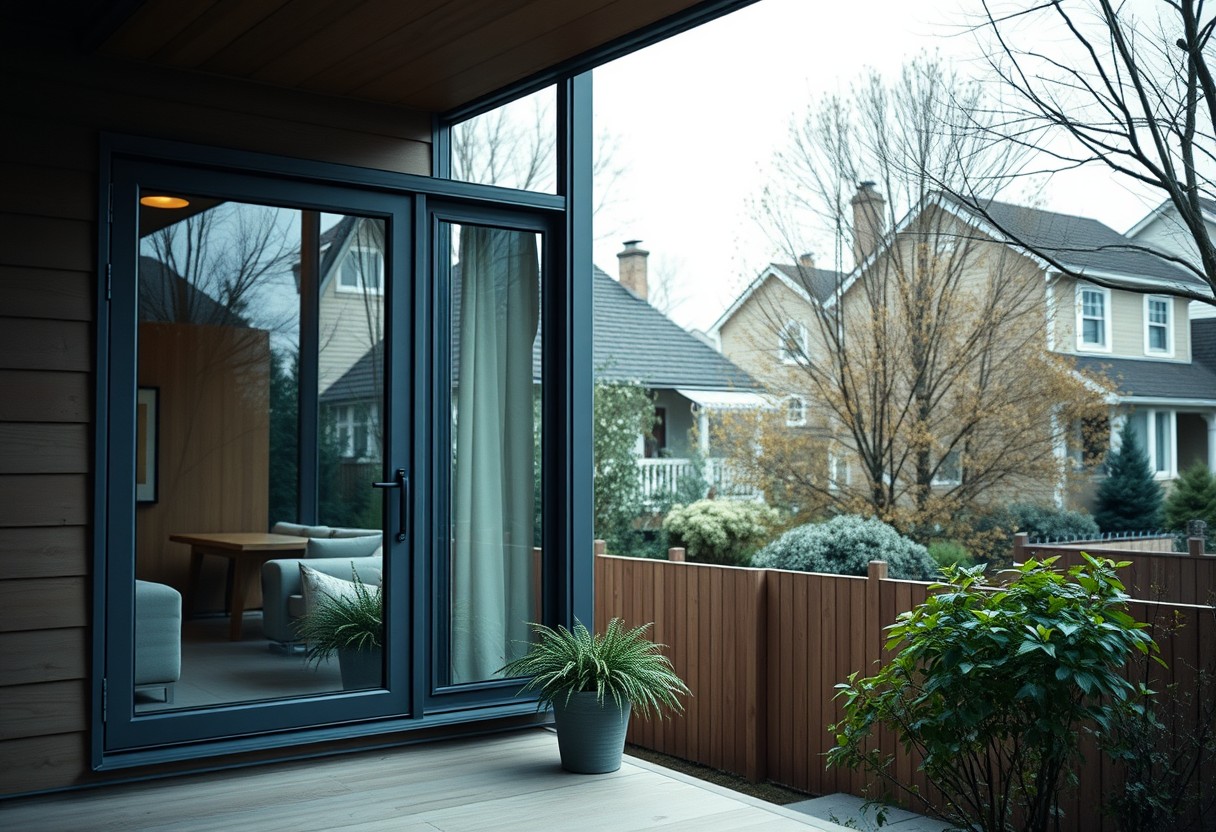
Cost Considerations
After deciding to invest in noise reduction windows, it’s crucial to consider the overall costs associated with your choices. You can find useful insights on How to Soundproof Your Windows (2024). Prices can vary significantly based on the brand, material, style, and installation expenses. Assessing these factors will help you to establish a budget that aligns with your financial capacity while addressing your noise concerns effectively.
Budgeting for Noise Reduction Windows
One of the first steps in budgeting for noise reduction windows is to research average costs. Different types and styles can range from £400 to over £1,200 per window. Factors such as the brand, frame material (wood, vinyl, or aluminium), and the complexity of the installation will influence pricing. Additionally, consider whether you need double or triple-glazed options, which may provide better soundproofing but can be more expensive. Ensure you allocate funds for any necessary modifications to your existing window frames.
Return on Investment
Beside the initial costs, evaluating the return on investment for noise reduction windows is vital. These windows not only deliver sound insulation but also significantly enhance energy efficiency. You may see lower energy bills, which contributes to long-term savings. Moreover, improving the acoustics of your home can lead to an increase in property value, making your investment worthwhile. Ultimately, by reducing noise, you enhance your quality of life and can contribute to potential health benefits.
Further, the advantages of installing noise reduction windows extend beyond mere aesthetics and comfort. The enhanced insulation can result in a substantial decrease in energy costs, while also offering increased property value should you decide to sell in the future. You will likely find that improved sound insulation also elevates your living environment, leading to better mental health and overall well-being. Investing in these windows is not just a financial decision; it’s an investment in your comfort and lifestyle.
Choosing the Right Windows for Your Home
Keep in mind that selecting the right noise reduction windows is necessary for achieving a peaceful home environment. Consider factors such as window materials, glazing options, and installation techniques. Each choice can significantly impact your home’s ability to insulate against external noise, ensuring you enjoy a quieter, more comfortable lifestyle.
Assessing Your Noise Levels
Keep in mind, assessing your specific noise problems is vital before making a window selection. Begin by using sound level meters to gauge the decibel levels in various areas of your home. Additionally, conduct personal assessments to identify peak noise times and sources, allowing you to accurately target the most affected areas when choosing your windows.
Consulting Professionals
Along with your assessments, consider consulting with professionals for tailored solutions to your noise issues. Expert guidance can help you navigate the myriad of options available, ensuring you choose the most effective noise reduction windows for your needs. Professionals can also assist with installation and maintenance, guaranteeing that your windows perform optimally, resulting in long-lasting peace and tranquillity in your home.
Above all, taking this step can lead to significant benefits. At this stage, you might find that professionals can identify hidden problems that you may overlook and provide industry insights that are invaluable. Not only can they recommend products best suited for your situation, but they can also offer expert installation services that ensure your windows are sealed correctly for maximum efficiency. This comprehensive assistance will ultimately enhance your living space, providing you with the serene environment you deserve.
Final Words
Upon reflecting, selecting the right noise reduction windows for your home is imperative to enhancing your living environment. You should consider factors such as the window’s glazing, frame material, and installation quality to ensure optimal sound insulation. By investing time in research and evaluating your specific needs, you can effectively reduce unwanted noise, leading to a more peaceful and comfortable home. Ultimately, the right choice will significantly contribute to your overall well-being and enjoyment of your living space.
FAQ
Q: What are noise reduction windows?
A: Noise reduction windows are specially designed windows that minimise the amount of external noise entering your home. They typically feature double or triple glazing, enhanced sealing, and specific acoustic properties to block sound waves effectively.
Q: How do I know if I need noise reduction windows?
A: If you live in a particularly noisy area, such as near a busy road, railway, or airport, you may benefit from noise reduction windows. Signs that indicate a need for these windows include frequent disturbances from outside noise, difficulty concentrating indoors, or trouble sleeping due to external sounds.
Q: What should I consider when choosing noise reduction windows?
A: When opting for noise reduction windows, consider factors such as the window’s sound transmission class (STC) rating, the type of glazing (double or triple), frame materials, and the quality of the installation. Additionally, evaluate your home’s overall energy efficiency and aesthetics, as these factors can influence your choice.
Q: What is the difference between double glazing and triple glazing?
A: Double glazing consists of two panes of glass with a space in between, offering better insulation and noise reduction compared to single glazing. Triple glazing has three panes of glass, which provides even greater thermal and acoustic insulation. The choice between the two depends on your specific noise levels and insulation needs.
Q: Are noise reduction windows energy efficient?
A: Yes, many noise reduction windows are designed to be energy efficient as well. The use of multiple glazing layers and insulated frames helps reduce heat loss, thereby lowering heating costs. Look for windows with good energy ratings to ensure you achieve both noise reduction and energy efficiency benefits.
Q: Can I install noise reduction windows myself?
A: While it is possible for experienced DIY enthusiasts to install noise reduction windows, it is typically recommended to hire a professional. Proper installation is vital for maximising the noise-reducing properties of the windows, as any gaps or incorrect fittings can significantly diminish their effectiveness.
Q: How much do noise reduction windows cost?
A: The cost of noise reduction windows can vary considerably based on several factors, including the type of glazing, frame materials, size, and installation fees. On average, expect to pay more for higher-quality glass and professional installation, but consider this an investment in the comfort and value of your home.


